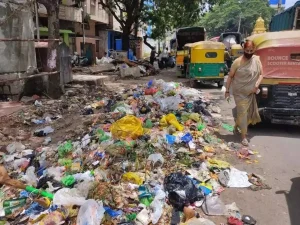Bengaluru – The Bengaluru municipal authorities have introduced a new garbage tax under the Solid Waste Management (SWM) framework, effective from April 1, 2025. The tax is designed to generate ₹600 crore annually for waste collection and disposal improvements. While the government claims that the policy will enhance waste management, it has faced resistance from residents and political leaders.
This article provides an in-depth analysis of the garbage tax, its structure, projected benefits, implementation challenges, and the reaction from various stakeholders.
Structure of the Garbage Tax
The garbage tax is linked to the property size of residential buildings and will be collected annually alongside property tax. The rate of the Garbage Tax varies according to built-up area:
- Up to 600 sq ft: ₹10 per month
- 600–1,000 sq ft: ₹50 per month
- 1,000–2,000 sq ft: ₹100 per month
- 2,000–3,000 sq ft: ₹150 per month
- 3,000–4,000 sq ft: ₹200 per month
- Above 4,000 sq ft: ₹400 per month
The authorities have justified this tiered pricing model by stating that larger properties generate more waste and should, therefore, contribute more toward its management.
Revenue Allocation and Expected Impact
With the projected ₹600 crore revenue, the municipality plans to implement several projects under the Bengaluru Solid Waste Management Limited (BSWML). A budget of ₹1,400 crore has been allocated for waste management, including:
- Setting up 27 waste transfer stations across Bengaluru.
- Establishing a material recovery facility with a processing capacity of 1,226 metric tonnes per day.
- Developing a 50 metric tonnes per day Bio-CNG unit.
- Constructing four biomethanation plants to manage organic waste.
- Building an 8 metric tonnes per day animal waste rendering and incineration facility.
These initiatives are expected to enhance Bengaluru’s waste disposal efficiency, minimize landfill dependency, and promote recycling practices.
Collection and Implementation

The Garbage Tax will be collected by municipal marshals equipped with point-of-sale machines. Additionally, an extra charge of ₹12 per kilogram will be imposed on bulk waste generators who do not implement in-situ waste processing. Those who adopt in-situ composting will receive a rebate of ₹3 per kilogram. This structure aims to incentivize sustainable waste management practices.
Resident Reactions and Public Concerns

While the garbage tax is seen as a necessary step toward improving waste management, it has met with mixed reactions from Bengaluru residents. Some citizens support the initiative, recognizing the importance of a cleaner city. However, concerns have been raised about the effective utilization of the collected funds.
Many residents have questioned whether the municipality will use the money transparently. They demand assurances that the tax will lead to tangible improvements in garbage collection and disposal rather than being mismanaged.
Political Reactions and Opposition Criticism
The garbage tax has also sparked debates among political leaders. Opposition parties have criticized the move, arguing that it places an unnecessary financial burden on citizens. They claim that the municipality should first improve its existing waste management system before introducing additional fees.
Some opposition leaders have accused the ruling administration of implementing the tax to cover budget deficits rather than genuinely improving waste disposal infrastructure. They have also demanded accountability mechanisms to ensure that funds are used for their intended purpose.
Comparative Analysis with Other Cities
Bengaluru is not the first Indian city to introduce a garbage tax. Other metropolitan areas, including Pune and Hyderabad, have implemented similar measures. In these cities, waste management fees have been integrated with property tax and adjusted based on property size and usage.
Studies have shown that such models have led to improvements in waste collection efficiency and increased recycling rates. However, success depends on transparent fund allocation and continuous monitoring of waste management services.
Challenges in Implementation


Despite its potential benefits, the garbage tax faces several challenges:
- Public Trust: Many residents remain skeptical about whether the funds will be used effectively.
- Enforcement Issues: Ensuring compliance, especially from bulk waste generators, requires strong monitoring mechanisms.
- Equity Concerns: The tiered pricing model has raised concerns about its impact on lower-income households with larger families.
Addressing these challenges will be crucial to the tax’s long-term success.
Future Outlook and Recommendations
For the garbage tax to be effective, the municipal authorities must:
- Ensure Transparency: Regular public disclosures of fund utilization should be mandatory.
- Encourage Community Participation: Engaging residents in waste management planning can foster greater acceptance.
- Invest in Sustainable Waste Management Solutions: Expanding recycling programs and composting facilities can reduce overall waste generation.
With proper execution, Bengaluru can set an example for other cities struggling with waste management.
Also Read: Critical Shift 2025: Annamalai May Step Down as BJP Chief in Tamil Nadu
Closing Statements
The introduction of the garbage tax marks a significant shift in Bengaluru’s approach to waste management. While it has the potential to improve waste collection and disposal, its success depends on effective implementation, transparency, and public cooperation. The coming months will be crucial in determining whether this initiative leads to a cleaner Bengaluru or becomes another bureaucratic burden for residents.

